How much of a strong Christian element will there be in Oliver Stone’s 9/11 movie that Paramount is releasing next August, and how much of a Chrisitan angle will be part of the marketing of this film? Andrea Berloff’s script is about the true story of two Port Authority cops, John McLoughlin (Nicolas Cage) and William J. Jimeno (Michael Pena), who were buried under the rubble of the fallen World Trade Center towers on 9.11. It’s been reported that the ex-Marine who drove down to the WTC site from Connecticut and wound up digging the cops out and saving their lives (In The Bedroom‘s William Maptoher is portraying him in the film) was a born-again Christian who he believed he was doing the bidding of a higher celestial power in performing his rescue. But what hasn’t been reported is that a late ’04 draft of Berfloff’s script has a scene in which Jesus Christ appears in a hallucination that Jimeno “sees” as he’s slipping in and out of consciousness due to a lack of water, and Christ offers water to him. This scene could easily have been tossed or not filmed, but if it stays and makes the final cut, Paramount Pictures, distributors of the Stone film, will obviously have marketing hook to try and attract the crowd that supported The Passion of the Christ and are soon expected to turn out big-time for The Chronicles of Narnia: The Lion, The Witch and the Wardrobe.
Month: December 2005
There’s a new Paul Thomas
There’s a new Paul Thomas Anderson script called, I think, Let There Be Blood ….wait a minute…is it There Will Be Blood? I can’t remember but neither will be used because women will be turned off and refuse to go if they stick with either one, and you just know every distributor out there (except, maybe, the all-seeing, all-knowing Bob Berney) will say “forget it” if Anderson insists on staying with either, so we’ll see. I’m mentioning this, in any event, because I’m wondering if anyone has read it or read coverage, even, and can give me a rundown.
Slate’s Matt Feeney suggests that
Slate‘s Matt Feeney suggests that one reason for the huge popular- ity of Matthew Vaughn’s Layer Cake on DVD (it’s earned about $20 million, or nine times the U.S. theatrical gross) is that it’s easier to understand the dialogue on a disc. The film’s Cockney accents were indecipherable to most American viewers in theatres, but Cake‘s popularity on DVD suggests, says Feeney, that “viewers are willing to abide this type of difficulty when the ‘pause’ and ‘rewind’ buttons are only a thumb’s-length away.” Maybe, but why would pause and rewind when you can just turn on the English subtitles? This is why, for me, I made a point of getting the DVD of Paul Greengrass’s Bloody Sunday, which I understood about 20% of, at most, when I saw it at Sundance three or four years ago.
I’m mentioning this about four
I’m mentioning this about four days later than I should have, but there’s a q & a transcript of a chat between Time film critic Rich- ard Schickel and Munich director Steven Spielberg on page 70 of the current issue. And the intro says that Spielberg has collab- orated with Schickel on a TV documentary called “Shooting War.” Schickel, as noted earlier, reviews Munich in the same issue (Munich is on the cover) and extremely favorably. Shouldn’t Schickel should recused himself from reviewing Munich on the grounds of his having worked with Spielberg on the doc? A guy who works for one of the trades has written me about this and called this “a profound conflict of interest. Schickel had no business — NONE — reviewing Munich. Indeed, he must bow out of reviewing any Spielberg film at all. This is really awful, and it makes the accompanying hype all the worse.”
Munich Shortfall
Munich Shortfall
I’m not trying to be a hard-ass for the sake of being a hard-ass, but I can’t get on the Oscar boat for Steven Spielberg’s Munich (Universal, 12.23).
It’s a pretty good movie, but the Best Picture hoo-hah seems a tiny bit forced given what this film truly is in the light of day. If you ask me those prognosticators who’ve already said “this is it!” are conning themselves.
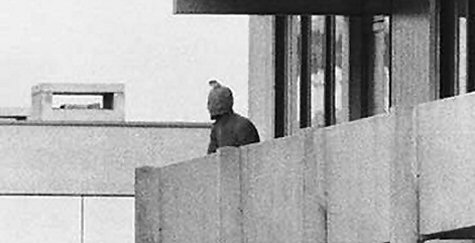
One of the Black September hostage-takers during the actual 1972 Munich Olympic Games standoff
Directed by Spielberg and written (for the most part) by Tony Kushner and Eric Roth, Munich is a longish (160 minutes), thoughtful drama about Israel’s revenge campaign against the perpetrators of the 1972 Munich Olympic Games killings of Israeli atheletes. It’s strong, meaningful and well-intended…but I don’t get all the jumping up and down.
I’m talking about the proclamations about it being the new Best Picture front-run- ner. It’s in the running, I guess, but it sure as shit is no shoo-in.
< ?php include ('/home/hollyw9/public_html/wired'); ?>
I spoke last night to a guy who’ll be voting this Saturday with the L.A. Film Critics, and we had both just seen Munich and were talking about the Best Picture Oscar contest, and he said, “I don’t know if [Munich] will even get nominated.”
He may have been overly dismissive, okay, but any seasoned film guy making such a statement should give you a hint about what’s going on here.
I felt the euphoric current at the DGA theatre last year after seeing Million Dollar Baby — I was levitating — but nothing like this kicked in last night inside theatre #5 at the AMC Century City.
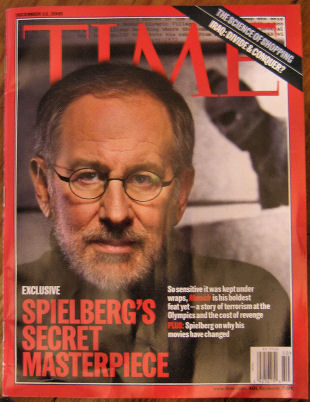
Munich wants first and foremost to say something earnest about the legacy of political killing. It’s a movie that doesn’t quite cry out for peace, but is clearly asking for it. It connects here and there in short bursts, but it mainly achieves a general mezzo-mezzo effect of “okay, good point, we get it.”
Which is why I don’t get the effusive praise from Time‘s Richard Schickel and Fox 411’s Roger Friedman and what I presume will be an oncoming tide of kiss-assers …the Spielberg kowtow brigade looking to show obeisance before power.
David Poland was more measured in his “Hot Button” reaction on Monday night, but he still believes from a hard-nosed realpolitik standpoint that Munich is the presumptive Best Picture winner, and that’s just wrong. Perhaps not inaccurate, but dead fucking “wrong” because Best Picture Oscars shouldn’t go to good movies that say the right thing, etc. but don’t inspire major passion.
Really exceptional movies always get people deep down in one way or another. They provoke, excite…make you choke up. They almost always deliver some kind of intrigue that usually builds and gains upon reflection. But I was not so moved last night.
I didn’t conduct a poll in theatre #5 but I could “feel the room” as the film unspooled and I’d be surprised if Munich aroused any go-for-broke fervor. But I’ll bet every last critic who saw it last night, if you were to pop the question, would say it’s a “good film” or “very strong” or “important.”
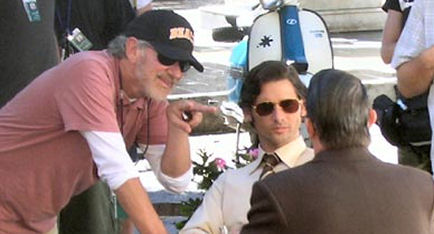
Steven Spielberg conferring with Eric Bana (shades) during last summer’s shooting of Munich
And it is that. Munich is a smart and stirring ride. It’s still with me this morning, still pinging around in my rib cage…and yes, I respect where it’s coming from and how Spielberg has organized the journey, for the most part.
And yes, of course, I agree with and support what Munich is saying about the rotten karma that comes out of any act of murder.
Munich is saying that however well justified or rationalized those revenge killings may have been, the air was still befouled and the spiritual effects upon three of the Mossad team — sensitive Israeli assassins played by Eric Bana, Mathieu Kosso- vitz and Ciaran Hinds — were disturbing and unsettling.
(Honestly? I felt almost relieved that two other guys on the team — Daniel Craig’s character and some older guy — don’t seem to pay the price as much. I don’t know why exactly, but I was vaguely comforted by these two being hardcore enough to just do the friggin’ job sans guilt trips.)
As a man with two sons, as a film critic, as a movie fiend…I side with any movie that says “killing is bad” or “killing others…even those who may deserve to die …will let loose a virus in your soul.”
But Munich rarely rises above the level of being dutiful, thoughtful and morally correct. All it is, really, is a sprawling here-and-there procedural with a gathering sense of moral disquiet. That’s a fine and respectable thing, but it doesn’t exactly set off tremors or firecrackers.
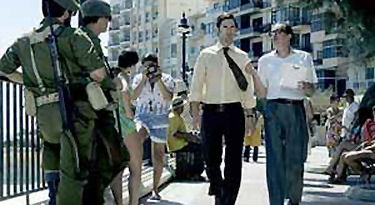
Eric Bana, Geoffrey Rush
Michael Lonsdale (whose performance as the investigator in Fred Zinneman’s The Day of the Jackal is one of my all-time favorites) is the best element in Munich. I also quite enjoyed the performance by Mathieu Almaric (last seen in Kings and Queen) as Lonsdale’s churlish son.
There is hoopla over Munich because it’s on the cover of this week’s Time and because the Best Picture situation is very much in flux and everyone’s looking for another Million Dollar Baby to sweep them off their feet.
I can sense a psychological eagerness to consider an end-of-the-year Spielberg movie about the ethical costs and karma of revenge…about the quandaries facing Jews and anti-Zionists in the Middle East as their conflict persists. Journos are primed because it’s that time of year and this is Spielberg-getting-all-morally- earnest-in-December and because everyone’s been saying “Munich is coming, Munich is coming” since last spring.
And everyone wants to savor Spielberg’s second big-statement movie about what good people have done when Jews have been killed because they’re Jews…killed by haters, racists, Nazis, anti-Zionists.
Oskar Schindler did what he did in Schindler’s List and became known to the audi- ence (as he had to his biographers) as a good, compassionate, peculiar, complex man. And the Mossad team led by Eric Bana are reasonably decent guys who go out and do what they do, and the virus of murder and retribution gets into their hearts and systems and they begin to pay the price.
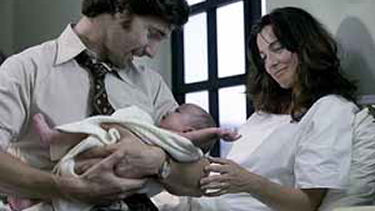
And poor Eric Bana’s character gets the worst of it because he finds it hard to concentrate on making love to his lusciously sexy wife in their Brooklyn apartment because he can’t get those images and sounds of the massacre at the Munich airport in ’72 out of his head…images and sounds he absorbed from TV coverage because he wasn’t there.
I’m not trying to be a smart-ass, but this bizarre sex scene reminded me a tiny bit of Woody Allen’s Alvy Singer not making love to Carol Kane in Annie Hall because he can’t stop talking about the Kennedy assassination and the Warren Report.
Is Munich profound? Is there anything earth-shaking here? In what way does this film step out and grab you by the shirt collar and say, “Wake up!” In what way does it rock anyone’s world in terms of technique, even?
Okay, it feels in some ways like a ’70s film…but that’s not making me shudder or leap out of my seat as I acknowledge this.
The most riveting portions, as you might expect, are about how the killings of the members and supporters of the Munich operation (the core group was known as “Black September”) are carried out, and what goes wrong. The strongest happen early on — a killing in Rome and then another in Paris, which involves a family man and his daughter.
There’s a particularly effective portion involving a pretty woman at a London hotel who gets briefly involved with Bana and Hinds, and a killing results, and then another killing. I don’t want to spoil but the whole cause-and-effect sequence is both sad and shocking.

Tony Kushner’s script gives each Doubting Thomas character a speech just as he starts crumbling, or just before fate is about to take a hand. There’s a certain wordy literalness going on here that isn’t quite as effective as Spielberg and Kushner would like it to be.
Munich ends in New York City with a long shot of a certain downtown landmark. A friend feels this shot was overdoing things a bit, but at least Spielberg doesn’t go in for a closeup, and the CG image is quite realisitic and haunting.
I have gotten to the point where Janusz Kaminski’s cinematography is starting to blatantly turn me off. He has become the one dp whose work really and truly irri- tates me.
Every film Kaminski has shot for Spielberg — War of the Worlds, The Terminal, Catch Me If You Can, Minority Report, A.I., Saving Private Ryan, Amistad and now Munich — has looked more or less the same to me, regardless of the theme or mood. I’m referring to the Kaminski palette of slightly desaturated color, a slightly misty soft-focus look, starchy white light flooding through windows during daytime scenes, a lack of sharpness, and a bizarre fondness for grain.
I think that calling this film Munich was a little bit of a chickenshit move. It should have simply been called Vengeance . I realize that the “Vengeance” book it’s partly based upon has blemishes against it, but vengeance is what this movie is primarily about, and Spielberg should have just copped to that.
Next Year’s Balloon
Here are some initial calls about next year’s Ocar contenders. I’d like to hear from anyone who’s read the scripts or can pass along versions of the scripts to yours truly…whatever. I just think it’s time to start looking ahead and planning ahead, etc.
Thanks to Canadian correspondent and rabid script-hound Jean-Francois Allaire for starting me on this jag…
Best Picture: The Departed (Warner Brothers); Babel (Paramount); The Good Shepherd (Universal Pictures); Southland Tales (Universal); Marie Antoinette (Columbia Pictures); The Pursuit of Happyness (Columbia Pictures); Breaking and Entering (The Weinstein Co.); All The King’s Men (Columbia Pictures); A Good Year (20th Century Fox); Stranger Than Fiction (Columbia).
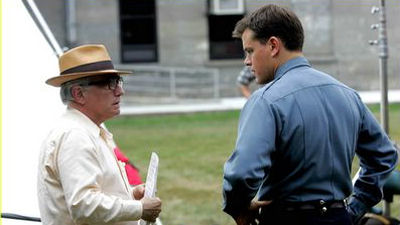
Martin Scorsese, Matt Damon on the set of The Departed
Best Director: Steve Zaillan (All The King’s Men); Anthony Minghella (Breaking and Entering); Martin Scorsese (The Departed); Steven Soderbergh (The Good German); Ridley Scott (A Good Year); Alejandro Gonzalez Inarritu (Babel); Marc Forster (Stranger Than Fiction); Richard Kelly (Southland Tales).
Best Actor: Will Smith (The Pursuit of Happyness); Matt Damon (The Good Shepherd); Jude Law (Breaking and Entering); Sean Penn (All The King’s Men); Brad Pitt (Babel).
Best Actress: Cate Blanchett (The Good German or Babel ); Maggie Gyllenhaal (Stranger Than Fiction)….need more!
Best Supporrting Actor: Jack Nicholson (The Departed); Hugh Grant (American Dreamz); Gael Garcia Bernal (Babel); Albert Finney (A Good Year); Jamie Foxx (Dreamgirls)
Best Supporting Actress: Zip…anyone?
Best Original Screenplay: Richard Kelly (Southland Tales); Paul Weitz (American Dreamz); Eric Roth (The Good Shepherd); Anthony Minghella (Breaking and Entering).
Best Adapted Screenplay : Sofia Coppola (Marie Antoinette).
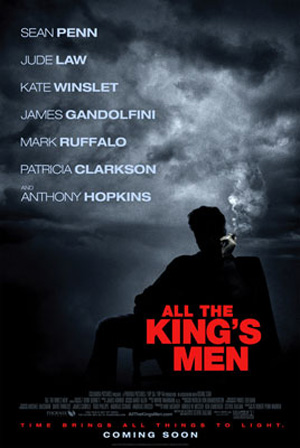
Rundown
The first high-profile award announcements will come this Saturday afternoon from the Los Angeles Film Critics, with the final calls starting to leak out sometime around 1 pm or 2 pm.
The National Board of Review — that odd-smelling, Manhattan-based, awards- dispensing group made up of mostly weirdos and wackos (with the noteworthy exception of respected Columbia film professor and scholar Annette Insdorf) would have been first — i.e., today — but the group has delayed their announcements until next Monday, 12.12, due to some omissions on their initially mailed-out ballot.

On the same day the New York Film Critics Circle will announce their picks (expected a final decision around 1 pm Eastern), and since the NYFCC is roughly eight or nine times more respected than the National Board of Review (or is that eighty or ninety times?), the likelihood is that reporters and Oscar assesors will pay even less attention to the NBR winners than usual.
The very next day (Tuesday, 12.13) the Golden Globe nominations will be announced. These noms will be a very big moment for Diane Keaton and The Family Stone…I hope, I hope. And let’s hope that Terrence Howard (Hustle & Flow), bless him, hangs in there as a Best Actor in a Drama nominee.
I don’t have the dates for all the other critics groups but many of them will start to weigh in next week also, or very soon after. Critics groups from Boston, San Francisco, Chicago, Miami, San Diego, Seattle, etc.
Then it’s Christmas and New Year’s and the annual depression and suicide surge that happens ever year, and then…well, here’s the schedule:

* Writers Guild of America and Producers Guild nominations: Wednesday, 1.4.06
* Screen Actors Guild and Directors Guild nominations: Thursday, 1.5.06.
* BFCA Awards: Monday, 1.9.06
* Golden Globe Awards: Monday, 1.16.06
* Directors Guild Awards: Saturday, 1.28.06
* Screen Actors Guild awards: Sunday, 1.29.06
* Academy Award nominations: Tuesday, 1.31.06
* Writers Guild Awards: Saturday, 2.4.06
* BAFTA Awards: Sunday, 2.19.06
* Independent Spirit Awards: Saturday, 3.4.06
* Academy Awards telecast: Sunday, 3.5.06
* Rest Period: March through late June-slash-early July ’06
* Campaigning Strategizing for 2006 Awards (i.e., 2007 Academy Awards) commences and long-term expectations begin to come into focus: Early to Mid-July 2006.

Rumble in the Jungle
I saw King Kong for the second time Monday morning (12.5), and I feel the same way I did after my first viewing Sunday night. About 110 minutes of this three-hour film (i.e., the last two-thirds) are rock ‘n’ roll and worth double the ticket price. And the finale is genuinely touching.
After Sunday night’s screening at the Academy theatre I called the better parts of this monkey movie “damned exciting in an emotional, giddily absurd, logic-free adrenalized way.”
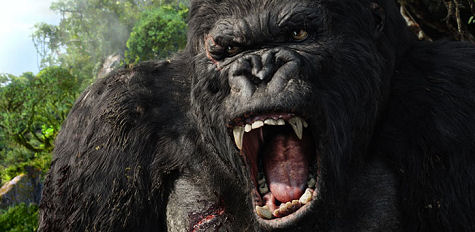
And then I offered a limited apology to its creator, Peter Jackson. “You aren’t that bad, bro,” I said. “You got a few things right this time. The movie is going to lift audiences out of their seats. And I need to say ‘I’m sorry’ for bashing you so much because you’ve almost whacked the ball out of the park this time.”
Almost, I say.
King Kong is too lumpy and draggy during the first hour or so to be called exquisite or masterful, but there’s no denying that it wails from the 70-minute mark until the big weepy finale at the three-hour mark. Monkey die, everybody cry.
The emotional support comes from the current between Kong and Naomi Watts, who is pretty much the soul of the film. I was concerned that the tender eye-rap- port between them would be too much, but it isn’t. It’s relatively restrained and subtle and full of feeling.
And Andy Serkis’ Kong performance doesn’t play like any kind of “Gollum Kong” (which I fretted about a year and a half ago in this space), and in fact he creates something surprisingly life-like, or do I mean ape-like?
The good ship Kong starts out with a spirited montage (scored with a classic Al Jolson tune called “I’m Sittin’ On Top of the World”) that shows what Depression- era 1933 New York City probably looked and felt like on the streets. The recrea- tions of this bygone Manhattan are awesome, immaculate…CGI illusion at its most profound.
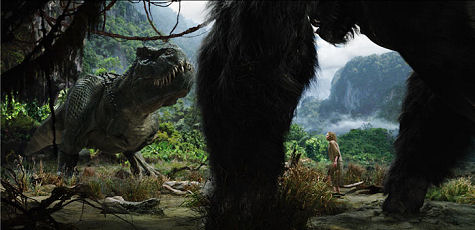
So the first ten or so minutes are fine, but then things start to get lunky and pokey and meandering, and the dialogue becomes increasingly stiff and speechy, and before you know it Kong is close to crashing on the rocks and suffering a gash in the hull.
It’s very touch-and-go from roughly the 10 to the 65- or 70-minute mark. I was shifting in my seat and going “uh-oh.” But things take off once Kong snatches Watts, and the energy stays high and mighty from there to the finale.
You can break Kong down into three sections…
(a) The draggy 70-minute first act, which is all New York set-up, character exposi- tion, the long sea voyage to Skull Island, tedious philosophizing and no action to speak of;
(b) the breathtaking, nearly 70-minute Skull Island rumble-in-the-jungle section, including the breathtaking dino-run sequence (an absolute instant classic that’s likely to drive most of the repeat business in and of itself), Kong vs. the T-Rex trio, and the icky spider-and-insect pit sequence;
(c) the 42 or 43-minute New York finale with Kong on-stage, breaking the chrome- steel chains and escaping, trashing Manhattan, finding Watts, and facing planes and fate atop the Empire State building.
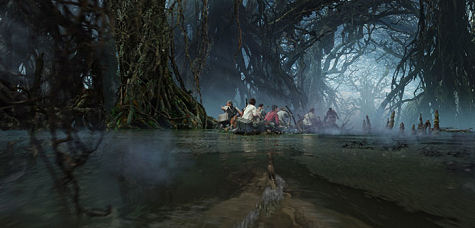
If I were a 14 year-old kid talking to friends about all of us seeing Kong a second or third time, I would suggest that everyone try to slip into the theatre after the first hour because who wants to sit through all that talky crap again?
Kong isn’t better than Jackson’s Heavenly Creatures because it’s almost entirely about enthusiasm and has almost nothing to do with restraint (bad word!), but it’s still the most thoroughly pulse-pumping, rousingly kick-ass film Jackson’s ever delivered, and respect needs to be paid.
And I mean especially by someone who’s been bashing the pud out of Jackson for the last four years or so, calling him an indulgent (and overly indulged), excessive, paint-splattering “wheeeeee!” director all this time.
Make no mistake — Kong shows Jackson is still all of these things. But Kong is a movie with a big heart and a stupidly exuberant joie de cinema coarsing through its veins…during the second and third acts, I mean.
And even though Jackson has gone way beyond the point where he’s able to show minimal respect for physics and could-this-happen? issues of logic and probability …a point from which he’ll never return…he manages such amazing visual feats and surges once the film takes off that all objections are moot. Even if some of the action scenes are cartoonishly wham-bam and ridiculous.
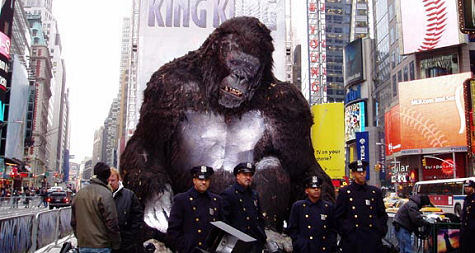
Life-size Kong model currently sitting in Manthatan’s Times Square
I’ll get into this a bit more later in the week, but I felt I had to cop to the fact that Jackson has hit one deep into center-left field.
Jack Black’s Carl Denham isn’t at all bad (he’s mouthy and slimy, but he doesn’t reach for outright comedy), Adrien Brody inhabits the playwright-hero to sensitive perfection, and Kong’s snaggle tooth is glimpsed only a few times and a non-issue.
Sometime next week I’m going to run a list of things in King Kong that make little or no sense (and it’s a long list), but right now it’s simply time to acknowledge that the parts of the film that get your blood racing and your emotions worked up work really well.
[Incidentally: I wrote last night that King Kong starts with an overture taken from Max Steiner’s original score for the 1933 film. However, I learned today [Monday] that Steiner’s overture was played before the presentation of Jackson’s film as a mood-setter by the people in the projection department at the Academy of Motion Picture Arts and Sciences theatre, so it isn’t attached to the film and won’t be heard by regular audiences. That’s a shame.]
Remember This

This is a few days
This is a few days late also, but at a fund-raiser last Sunday for the American Museum of the Moving Image in Queens, and which honored Cinderella Man director Ron Howard, Michael Keaton made a cheap crack. (The event, as reported by Roger Friedman, was atttended by Howard, his producing partner Brian Grazer, Jim Carrey, Edie Falco, Renee Zellweger, Goldie Hawn, Kurt Russell, et. al.) “The bad news is that Russell Crowe isn’t here,√¢‚Ǩ‚Ñ¢√É‚Äû√ɬπ Keaton quipped. “The good news is that we don’t have to listen to his [expletive deleted] band. They suck. They√¢‚Ǩ‚Ñ¢√É‚Äû√ɬ¥re horrible. John McCain came up with the anti-torture bill about them.” Oh, yeah? I’ve listened to some tracks by Crowe’s band, 30 Odd Foot of Grunts, and they sound fine. (I got into them after watching a pretty good documentary about the band, called Texas, at a Sundance Film Festival five or six years ago.) They have their own sound (they specialize in folk ballads) and they’re totally tight and professional sounding, and Crowe has a smooth crooning voice and does really well by that.
Munich Jitters
Munich Jitters
It’s Wednesday afternoon and everyone’s calling around and asking about Munich …how good, how invincible or vulnerable, and is anyone having shit-fits and if so, who?…whaddaya hear, whaddaya think?
There’s already a half-formed perception that Steven Spielberg’s film isn’t Million Dollar Baby, but some journos are taking their shirts off and waving them over their heads anyway and calling it the new front-runner.

Steven Spielberg conferring with Eric Bana (shades) during last summer’s shooting of Munich
Maybe it is that. I’ll be seeing Munich in about two hours (Wednesday at 7 pm) so I’ll know fairly soon, but in these anxious pre-dawn hours before hitting the beach …er, the AMC Century City complex, it’s probably best to process the Spielberg kowtow with a grain of salt.
Richard Schickel, David Poland, Roger Friedman…can’t quite trust ’em.
You can’t trust Schickel and that Time cover story because as brilliant and insight- ful as he usually is, Schickel is a political operator of sorts, and it seems fair to presume he’s always thinking about his next documentary or subject for his next biography, which may one day (who knows?) be about Spielberg.
< ?php include ('/home/hollyw9/public_html/wired'); ?>
Schickel may be dead-on about Munich, but I can’t buy the shpiel…yet.
You can’t trust Poland’s somewhat measured rave that he posted in his “Hot But- ton” column Monday night, because…smell the coffee…we all have our prejudices and he’s been calling Munich the presumptive front-runner for a long time now, and because he’s been lightly dissing Brokeback Mountain since he first saw it at last September’s Telluride Film Festival.
My antennae reading is that Poland’s been emotionally invested in wanting to steer support away from Ang Lee’s obviously brave and devastating film ever since, and now he’s got a thoughtful and gripping film to fight for, so it’s time to mount that steed and get out that bugle.

And you have to look askance at Roger Friedman’s proclamation in his Fox 411 column (posted late Tuesday night) that “Spielberg’s ‘Munich’ Is the Best Movie of 2005.”
Not because Roger is wrong (I don’t know a damn thing) but because he dismissed Brokeback Mountain as “silly” in a version of the column that ran last night (it’s been deleted, but I saw it last night with my own eyes) and he’s also called it a “strange western.”
To bluntly backhand Munich‘s strongest competitor with a jab like that is thought- less and kinda strange in itself. A movie that has made people weep and now sits at the top of MCN’s Gurus of Gold lists as the most likely Best Picture nominee is “silly”?

Cuddling babies, killing terrorists…two sides of the same sensitive-guy coin
There’s no reason to think Munich isn’t going to be a riveting and stirring film, but will it knock Brokeback‘s stetson off and send it splashing into a mud puddle?
I’ll keep refreshing and adding to this piece over the next 24 to 36 hours as things happen and other voices chime in, but for now…
Next Year’s Balloon
Here are some initial calls about next year’s Ocar contenders. I’d like to hear from anyone who’s read the scripts or can pass along versions of the scripts to yours truly…whatever. I just think it’s time to start looking ahead and planning ahead, etc.
Thanks to Canadian correspondent and rabid script-hound Jean-Francois Allaire for starting me on this jag…
Best Picture: The Departed (Warner Brothers); Babel (Paramount); The Good Shepherd (Universal Pictures); Southland Tales (Universal); Marie Antoinette (Columbia Pictures); The Pursuit of Happyness (Columbia Pictures); Breaking and Entering (The Weinstein Co.); All The King’s Men (Columbia Pictures); A Good Year (20th Century Fox); Stranger Than Fiction (Columbia).

Martin Scorsese, Matt Damon on the set of The Departed
Best Director: Steve Zaillan (All The King’s Men); Anthony Minghella (Breaking and Entering); Martin Scorsese (The Departed); Steven Soderbergh (The Good German); Ridley Scott (A Good Year); Alejandro Gonzalez Inarritu (Babel); Marc Forster (Stranger Than Fiction); Richard Kelly (Southland Tales).
Best Actor: Will Smith (The Pursuit of Happyness); Matt Damon (The Good Shepherd); Jude Law (Breaking and Entering); Sean Penn (All The King’s Men); Brad Pitt (Babel).
Best Actress: Cate Blanchett (The Good German or Babel ); Maggie Gyllenhaal (Stranger Than Fiction)….need more!
Best Supporrting Actor: Jack Nicholson (The Departed); Hugh Grant (American Dreamz); Gael Garcia Bernal (Babel); Albert Finney (A Good Year); Jamie Foxx (Dreamgirls)
Best Supporting Actress: Zip…anyone?
Best Original Screenplay: Richard Kelly (Southland Tales); Paul Weitz (American Dreamz); Eric Roth (The Good Shepherd); Anthony Minghella (Breaking and Entering).
Best Adapted Screenplay : Sofia Coppola (Marie Antoinette).

Rundown
The first high-profile award announcements will come this Saturday afternoon from the Los Angeles Film Critics, with the final calls starting to leak out sometime around 1 pm or 2 pm.
The National Board of Review — that odd-smelling, Manhattan-based, awards- dispensing group made up of mostly weirdos and wackos (with the noteworthy exception of respected Columbia film professor and scholar Annette Insdorf) would have been first — i.e., today — but the group has delayed their announcements until next Monday, 12.12, due to some omissions on their initially mailed-out ballot.

On the same day the New York Film Critics Circle will announce their picks (expected a final decision around 1 pm Eastern), and since the NYFCC is roughly eight or nine times more respected than the National Board of Review (or is that eighty or ninety times?), the likelihood is that reporters and Oscar assesors will pay even less attention to the NBR winners than usual.
The very next day (Tuesday, 12.13) the Golden Globe nominations will be announced. These noms will be a very big moment for Diane Keaton and The Family Stone…I hope, I hope. And let’s hope that Terrence Howard (Hustle & Flow), bless him, hangs in there as a Best Actor in a Drama nominee.
I don’t have the dates for all the other critics groups but many of them will start to weigh in next week also, or very soon after. Critics groups from Boston, San Francisco, Chicago, Miami, San Diego, Seattle, etc.
Then it’s Christmas and New Year’s and the annual depression and suicide surge that happens ever year, and then…well, here’s the schedule:

* Writers Guild of America and Producers Guild nominations: Wednesday, 1.4.06
* Screen Actors Guild and Directors Guild nominations: Thursday, 1.5.06.
* BFCA Awards: Monday, 1.9.06
* Golden Globe Awards: Monday, 1.16.06
* Directors Guild Awards: Saturday, 1.28.06
* Screen Actors Guild awards: Sunday, 1.29.06
* Academy Award nominations: Tuesday, 1.31.06
* Writers Guild Awards: Saturday, 2.4.06
* BAFTA Awards: Sunday, 2.19.06
* Independent Spirit Awards: Saturday, 3.4.06
* Academy Awards telecast: Sunday, 3.5.06
* Rest Period: March through late June-slash-early July ’06
* Campaigning Strategizing for 2006 Awards (i.e., 2007 Academy Awards) commences and long-term expectations begin to come into focus: Early to Mid-July 2006.

Rumble in the Jungle
I saw King Kong for the second time Monday morning (12.5), and I feel the same way I did after my first viewing Sunday night. About 110 minutes of this three-hour film (i.e., the last two-thirds) are rock ‘n’ roll and worth double the ticket price. And the finale is genuinely touching.
After Sunday night’s screening at the Academy theatre I called the better parts of this monkey movie “damned exciting in an emotional, giddily absurd, logic-free adrenalized way.”

And then I offered a limited apology to its creator, Peter Jackson. “You aren’t that bad, bro,” I said. “You got a few things right this time. The movie is going to lift audiences out of their seats. And I need to say ‘I’m sorry’ for bashing you so much because you’ve almost whacked the ball out of the park this time.”
Almost, I say.
King Kong is too lumpy and draggy during the first hour or so to be called exquisite or masterful, but there’s no denying that it wails from the 70-minute mark until the big weepy finale at the three-hour mark. Monkey die, everybody cry.
The emotional support comes from the current between Kong and Naomi Watts, who is pretty much the soul of the film. I was concerned that the tender eye-rap- port between them would be too much, but it isn’t. It’s relatively restrained and subtle and full of feeling.
And Andy Serkis’ Kong performance doesn’t play like any kind of “Gollum Kong” (which I fretted about a year and a half ago in this space), and in fact he creates something surprisingly life-like, or do I mean ape-like?
The good ship Kong starts out with a spirited montage (scored with a classic Al Jolson tune called “I’m Sittin’ On Top of the World”) that shows what Depression- era 1933 New York City probably looked and felt like on the streets. The recrea- tions of this bygone Manhattan are awesome, immaculate…CGI illusion at its most profound.

So the first ten or so minutes are fine, but then things start to get lunky and pokey and meandering, and the dialogue becomes increasingly stiff and speechy, and before you know it Kong is close to crashing on the rocks and suffering a gash in the hull.
It’s very touch-and-go from roughly the 10 to the 65- or 70-minute mark. I was shifting in my seat and going “uh-oh.” But things take off once Kong snatches Watts, and the energy stays high and mighty from there to the finale.
You can break Kong down into three sections…
(a) The draggy 70-minute first act, which is all New York set-up, character exposi- tion, the long sea voyage to Skull Island, tedious philosophizing and no action to speak of;
(b) the breathtaking, nearly 70-minute Skull Island rumble-in-the-jungle section, including the breathtaking dino-run sequence (an absolute instant classic that’s likely to drive most of the repeat business in and of itself), Kong vs. the T-Rex trio, and the icky spider-and-insect pit sequence;
(c) the 42 or 43-minute New York finale with Kong on-stage, breaking the chrome- steel chains and escaping, trashing Manhattan, finding Watts, and facing planes and fate atop the Empire State building.

If I were a 14 year-old kid talking to friends about all of us seeing Kong a second or third time, I would suggest that everyone try to slip into the theatre after the first hour because who wants to sit through all that talky crap again?
Kong isn’t better than Jackson’s Heavenly Creatures because it’s almost entirely about enthusiasm and has almost nothing to do with restraint (bad word!), but it’s still the most thoroughly pulse-pumping, rousingly kick-ass film Jackson’s ever delivered, and respect needs to be paid.
And I mean especially by someone who’s been bashing the pud out of Jackson for the last four years or so, calling him an indulgent (and overly indulged), excessive, paint-splattering “wheeeeee!” director all this time.
Make no mistake — Kong shows Jackson is still all of these things. But Kong is a movie with a big heart and a stupidly exuberant joie de cinema coarsing through its veins…during the second and third acts, I mean.
And even though Jackson has gone way beyond the point where he’s able to show minimal respect for physics and could-this-happen? issues of logic and probability …a point from which he’ll never return…he manages such amazing visual feats and surges once the film takes off that all objections are moot. Even if some of the action scenes are cartoonishly wham-bam and ridiculous.

Life-size Kong model currently sitting in Manthatan’s Times Square
I’ll get into this a bit more later in the week, but I felt I had to cop to the fact that Jackson has hit one deep into center-left field.
Jack Black’s Carl Denham isn’t at all bad (he’s mouthy and slimy, but he doesn’t reach for outright comedy), Adrien Brody inhabits the playwright-hero to sensitive perfection, and Kong’s snaggle tooth is glimpsed only a few times and a non-issue.
Sometime next week I’m going to run a list of things in King Kong that make little or no sense (and it’s a long list), but right now it’s simply time to acknowledge that the parts of the film that get your blood racing and your emotions worked up work really well.
[Incidentally: I wrote last night that King Kong starts with an overture taken from Max Steiner’s original score for the 1933 film. However, I learned today [Monday] that Steiner’s overture was played before the presentation of Jackson’s film as a mood-setter by the people in the projection department at the Academy of Motion Picture Arts and Sciences theatre, so it isn’t attached to the film and won’t be heard by regular audiences. That’s a shame.]
Remember This

“Munich is not quite, at
“Munich is not quite, at least on first blush, the unstoppable Oscar powerhouse that I first thought it might be,” admits David Poland in his current “Hot Button” column about his viewing of Steven Spielberg’s film last night (i.e., Monday). “But it is still the likely winner of this year’s Best Picture Oscar, in my opinion.” [I presume readers are aware that whenever a writer says “in my opinion,” it means he/she is feeling less than 100% resolved.] “It is serious…it is excellent,” Poland continues. “And it is about something important beyond its own storytelling parameters. Brokeback Mountain will have its supporters, but I don’t see it overcoming this film, which speaks to bigger issues, though the issues in Brokeback are extremely important to its constituency.” In other words, if you’re gay or female Brokeback may mean a lot to you, but if you’re a thoughtful two-fisted hetero guy you’re going to find “bigger issues” — i.e., more important content — in Munich, and probably even more so if you’re Jewish. And yet Poland’s first out-of-the-gate reaction to Munich…the first thought that seemed strong enough to merit mention…is that all the performances are strong (especially Michael Lonsdale’s “near cameo”). He states toward the end of the piece that “the theme of [Munich] is the dehumanizing nature of violence over time. No matter how well founded — in your mind or in reality — the ‘right’ to kill is, in order to maintain focus on the effort, one must dehumanize both their target and themselves.” Uhm…okay. But uhm…may I say something? Has there ever been an intelligent film about protagonists involved in killing people that doesn’t convey the idea, in one fashion or another, that violence is dehumanizing all around? Including (but certainly not limited to) Peter Weir’s Witness, Fred Zinneman’s High Noon, Sam Peckinpah’s The Wild Bunch, Michael Mann’s Collateral and about 20 or 30 other films I could mention off the top of my head?
Correction: The trades will be
Correction: The trades will be out Friday, 12.16 with their reviews of Terrence Malick’s The New World (New Line, 12.25 limited). Most critics will love it, Academy members will run hot, lukewarm and cold, and the paying public….well, who knows? Film sophisticates will turn out, of course…ditto anyone bored with the commercial mainstream output these days…anyone with an appreciation for an unusually told love story…it’s a sumptuous art film and a class act all the way.
It was supposed to be
It was supposed to be okay as of yesterday (12.5) to start riffing about The Producers (Universal, 12.16), so where are the trade reviews? Let me be among the first to say that this big swanky movie musical may be square (i.e., in a Mel Brooks time-capsule way, which means square with a certain historical authority) but very entertaining in a brassy and unapologetic Tin Pan Alley fashion. The Broadway musical worked beautifully and this is a stodgy but fervent capturing of that Broadway show …and there’s really nothing to beef about. It plays fine even if you never saw the show but liked the original 1968 Mel Brooks non-singing filmed comedy. Nathan Lane’s Zero Mostel-like Max Bialystock is a raucous ride in itself, and chubby Matthew Broderick is loads of fun as Leo Bloom. A bewigged Uma Thurman really gets into that parody-of-a-broadly-sexual-babe routine that Madeline Kahn used to do for Brooks in the ’70s. Will Ferrell is oafishly tedious in the Kenneth Mars part, and is wearing out his welcome fast. Susan Stroman directed, but of course she didn’t make a move without Mel Brooks’ say-so. The queeny gay humor is “funny” in a vaudevillian sense, but only in Brooksland are gay men portrayed as unregenerate pre-Stonewall effeminates. (You just know that Middle Americans will be more comfortable with this shtick than anything in Brokeback Mountain.) Stranger still is Stroman’s visual sense, or rather the photography by John Bailey and Charles Minsky. The Producers is shot and edited as if it was directed by Henry Koster or Henry King in the mid 1950s. The camera just sits there like it weighs ten tons and can only be moved with herculean effort. You couldn’t get further away from the frenetic visuals of Baz Luhrman’s Moulin Rouge if you tried. There’s nothing “wrong” with an approach that says “this is a story set in 1959 or thereabouts, so let’s make a movie that feels like it was shot back then.” But it’s also just plain old-fogeyish, and I wonder how it will sit with the under-25s.
“I don’t think any movie
“I don’t think any movie or any book or any work of art can solve the stalemate in the Middle East today,” Steven Spielberg has said in reply to a question about Munich, which deals with Israel’s revenge campaign over the 1972 Olympic massacre murders. “But it’s worth a try. Somewhere inside all this intransigence there has to be a prayer for peace. The biggest enemy is not the Palestinians or the Israelis. The biggest enemy in the region is intransigence.” A wise and perceptive thought…and yet something in me recoils when moral and ethical ruminations become part of a movie’s marketing campaign, however relevant they may be to the subject matter. Paddy Chayefsky once wrote that “nobody gets moral unless they want to get something or get out of something.” Political considerations must be set aside — Munich will rise or fall based on whether it has at least two and preferably three killer scenes that sink in and stick to your ribs. If it has these, watch out.
Here we are at the
Here we are at the end of the year with a couple of weeks left to sift things through before everyone leaves for the Xmas holiday, and I’m only just starting to hear about screenings of two big-studio comedies — Dean Parisot’s Fun With Dick and Jane (Columbia, 12.21) and Rob Reiner’s Rumor Has it (Warner Bros., 12.25). We all know that a typical Meathead movie (i.e., one directed by Rob Reiner) will be conservative and tonally smoothed-out as well as diametrically opposed to any kind of loosey-goosey 1980s Pedro Almodovar sensibility, so that kind of diminishes the Rumor want-to-see right off the top of the deck. (Honestly? I’m more interested right now in those Jennifer Aniston papparazzi boob shots that her attorney has been threatening magazine editors about.) I just got invited to a December 12th London screening of Fun With Dick and Jane by Sony’s Anna Whelan…but the Culver City Sony team is curiously silent. (Wait…have I been taken off the screening list because of my Geisha comments?) The irony is that Dean Parisot (director of the great Galaxy Quest and the under-valued Home Fries) is a good guy with good instincts…but leave it to Sony’s p.r. team to convey the opposite impression. Dick and Jane, a remake of a not-very-good 1977 comedy that was co-written by Judd Apatow, Nicholas Stoller and Peter Tolan, was said to be a “troubled” during production…but that’s just talk. It’s about ideal married couple Dick (Jim Carrey) and Jane (Tea Leoni) freaking and turning to larceny when their income dries up.
